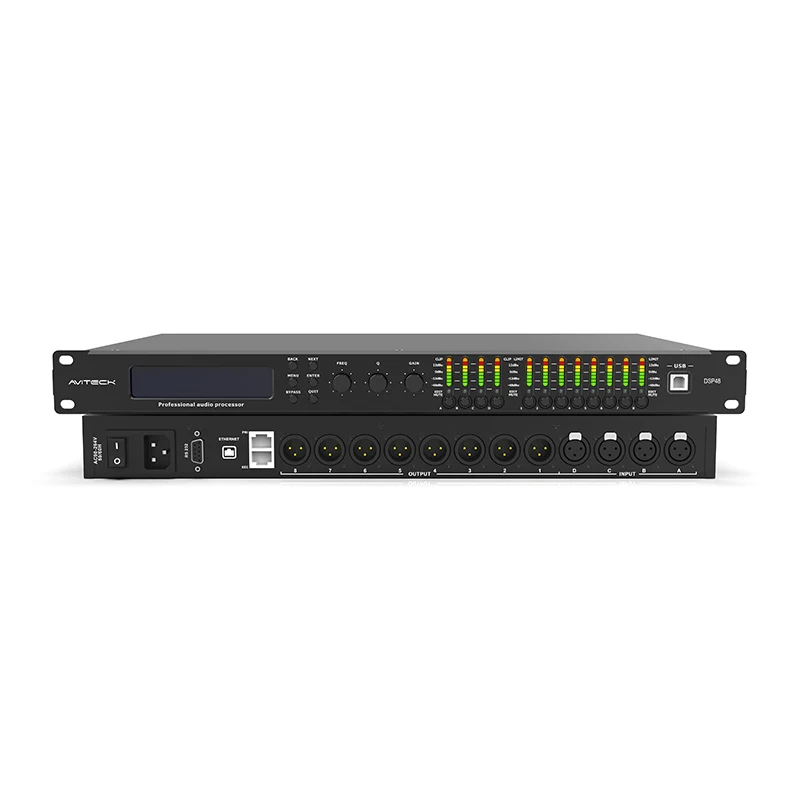
- English
- Español
- Português
- русский
- Français
- 日本語
- Deutsch
- tiếng Việt
- Italiano
- Nederlands
- ภาษาไทย
- Polski
- 한국어
- Svenska
- magyar
- Malay
- বাংলা ভাষার
- Dansk
- Suomi
- हिन्दी
- 繁体中文
- العربية
- Indonesia
- فارسی
- Eesti Keel
- Srpski језик
- Afrikaans
- icelandic
- беларускі
- Hrvatski
- ភាសាខ្មែរ
- ქართული
- Maori
- Тоҷикӣ
- O'zbek
- Հայերեն
- Lietuvos
- שפה עברית
- Pilipino
- Türkçe
- Gaeilge
- Norsk
- český
- ελληνικά
- український
- български
- ລາວ
- Latine
- Қазақша
- Slovenský jazyk
Application Scenarios of Digital Audio Processors
A digital audio processor, to put it simply, is a sonic magician, capable of making the sounds you hear sound better and more professional. This technology has now permeated every corner of our lives. Let me show you how.
First, let's talk about the happenings in KTV rooms. Have you ever noticed that when you go to a karaoke bar, some people sing the same song like a professional, while others... ahem. Many KTVs are equipped with digital audio processors, which automatically correct pitch and add reverberation, making even a tone-deaf voice sound presentable. Some advanced processors can even automatically adjust the effect based on the song type, adding warmth to love songs and power to rock performances.
Let's take a look at livestreaming by influencers. Which current streamer doesn't use some audio processing? Processors can eliminate ambient noise, filtering out distracting sounds like keyboard clatter and air conditioning, and making the streamer's voice sound richer and more engaging. Some streamers can even change their voices in real time, switching from a mature voice to a young woman's, all thanks to these devices working in the background.

Music production goes without saying. In professional recording studios, digital audio processors (DAPs) can process sound with millisecond precision, separating vocals from accompaniment and adjusting the volume balance of individual instruments. Many independent musicians now create at home, and with this equipment, they can produce near-professional-quality work.
Cinemas and theaters are also major users of this technology. High-end technologies like Dolby Atmos and IMAX sound are powered by DAPs. They intelligently distribute sound based on the theater's seating layout, ensuring optimal listening experience no matter where you sit.
Now, even car audio systems are beginning to utilize this technology. High-end car audio systems can automatically adjust volume based on speed, identify passenger positions to provide personalized sound fields, and even simulate the stereo effect of a concert hall.
Even more impressively, this technology can be used in the medical field. Some hearing-assistive devices use DAPs to amplify specific frequencies, helping people with hearing impairments hear their surroundings more clearly. Some rehabilitation centers also use DAPs to improve the speech skills of stroke patients.
In short, digital audio processors have moved from the professional field to ordinary people's homes, quietly changing the way we listen to the world. Next time you enjoy good sound, don't forget that there may be a digital audio processor working silently behind the scenes.
As a professional manufacturer and supplier, we provide high-quality products. If you are interested in our products or have any questions, please feel free to contact us.



